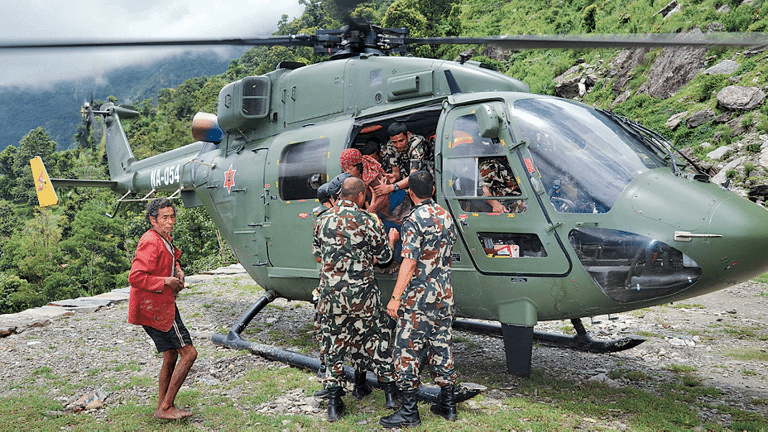
An innovative helicopter retrieval project that was pioneered at HMRI by Distinguished Laureate Professor Roger Smith and former HMRI PHD student, Dr Binod Sharma, has just received a funding injection of $146.4M.

The funds will be used to develop emergency resilience in Gandaki Province and another province in Eastern Nepal by establishing a Helicopter Ambulance in Pokhara and paying for individual villages to construct helicopter landing pads.
The original iteration of the program repurposes military helicopters to airlift women experiencing an obstetric emergency from regional areas in Nepal to hospitals, usually in large cities like Pokhara with well-equipped hospitals.
So far the retrieval program has rescued over 600 women with none dying during transportation. The current program is run using private helicopters as well as military helicopters.
Roger says, “Using helicopter retrievals overcomes the tyranny of the bad roads. The hospital staff are ready for them and they are taken to hospitals with 24 hour emergency care.”
Beyond this, it’s also a practical solution to helping train military personnel. The helicopter pilots need to go on training runs. By collecting patients in a time-sensitive way from previously unfamiliar locations, the training activity more closely resembles something that would happen in a conflict situation.
Roger says that there have been some unexpected consequences of the work.
“When a helicopter shows up in a rural village, it shows that the government cares about women. This can lead to a change in status for women. These helicopters also go to all provinces of Nepal, regardless of religion or ethnicity. This actually helps reduce inter-ethnic and inter-religious tensions,” says Professor Smith.
The vision for this mode of emergency retrieval for women in obstetric distress goes beyond Nepal. Professor Smith says that it could work in any developing nation where there is a military helicopter fleet.
“Whether it’s Indonesia, Papua New Guinea, Kenya or Tanzania, these countries have a few things in common, namely poverty, lack of resources and terrible roads. I hope we can now roll out this approach in other low income countries,” says Professor Smith.